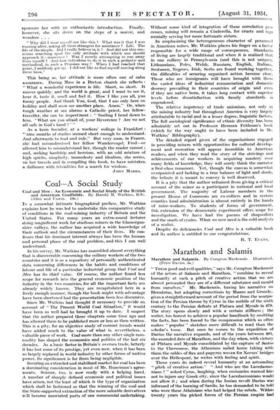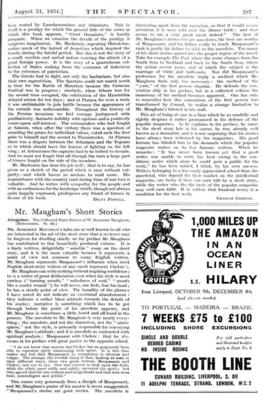Marathon and Salamis THEIR good and evil qualities;' says Mr.
Compton Mackenzie of the actors at Salamis and Marathon, " combine to reveal humanity at such a pitch of creative action that we are almost persuaded they are of a different substance and mould from ourselves." Mr. Mackenzie, basing his narrative on Herodotus, but adopting corrections by Munro and Grundy. gives a straightforward account of the period from the usurpa- tion of the Persian throne by Cyrus in the middle of the sixth century to the Persian defeats at Plataea and Mycale in 479. The story opens slowly and with a certain stiffness ; the writer, too honest to achieve a popular handbook by omitting the facts, has been forced to the compression which so often makes " popular " sketches more difficult to read than the Scholar's tome. But once he comes to the expedition of Darius the narrative expands, and of the years between 491. the emended date of Marathon, and the day when, with victory at Plataea and Mycale consolidated by the capture of Sestos in the fhersonesei the Athenians sailed home taking with them the cables of flax and papyrus woven for Xerxes' bridges over the Hellespont, he writes with feeling and spirit.
Those years do indeed reveal humanity at an astounding pitch of creative action." " And who are the Laceclaenio- ,dans ? " asked Cyrus, laughing, when emissaries warned hint not to injure any Greek city, since the Lacedaemonians would not allow it ; and when during the Ionian revolt Darius was informed of the burning of Sardis, he too demanded to be told who were these Athenians who had helped the rebels. Within 'twenty years the picked forces of the Persian empire had
been routed by Lacedaemonians and Athenians. This in itself is a prodigy for which the general title of the series in which this book appears, " Great Occasions," is hardly adequate. When we examine the details of the prodigy it outgrows imagination. Mr. Mackenzie, repeating Herodotus, makes much of the hatred of despotism which inspired the Greeks during the fateful period. But this is not the story of a small, resolute and united nation resisting the attack of a great foreign power. It is the story of a quarrelsome col- lection of States rushing from the extremes of indecision to the extremes of patriotism.
The Greeks had to fight, not only the barbarians, but also their own superstition. The Spartans could not march north in time for the Battle of Marathon because the Carneian Festival was in progress ; similarly, when Athens was for the second time occupied, the celebration of the Hyacinthia delayed action for ten days ; and at Plataea for over a week it was unthinkable to join battle because the appearance of the entrails was imfavourable. Throughout the history of the Persian invasions we find courage juxtaposed with pusillanimity, fantastic nobility with egotism and a positively comic-opera self-interest. The conmianders who had fought at Salamis, when after the victory there was a question of awarding the prizes for individual valour, voted each the first prize to himself and the second to Themistocles. At Plataea there was a dispute between the Athenians and the Tegeans as to which should have the honour of fighting on the left wing ; at Artemisium the captains had to be bribed to remain. And we must not forget that all through the wars a large part of Greece fought on the side of the invaders.
Mr. Mackenzie has done his job well ; that is to say, he has given us a sketch of the period which is easy without vul- garity—and which leaves us anxious to read more. His acquaintance with the country (and during time of war too) is valuable. And he writes with sympathy for the people and with an enthusiasm for the landscape which, though not always quite happily expressed, predisposes any friend of Greece in







































 Previous page
Previous page